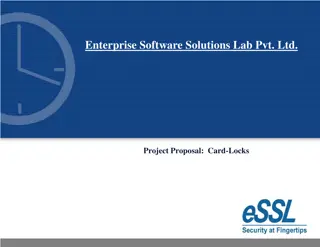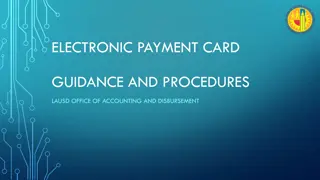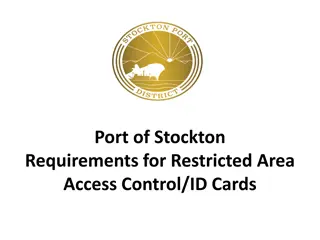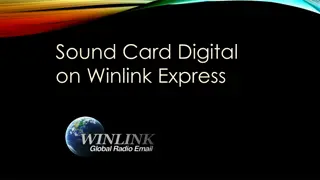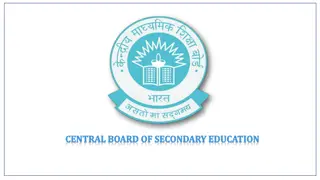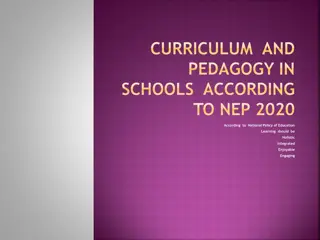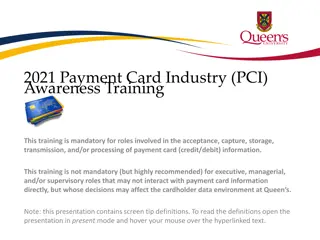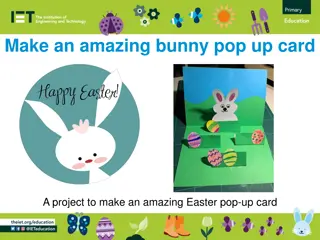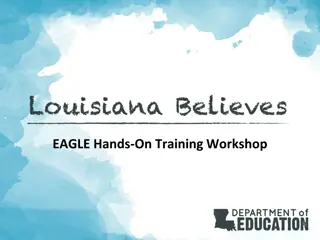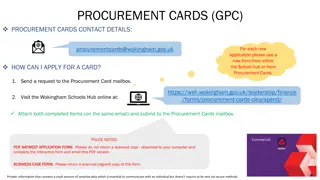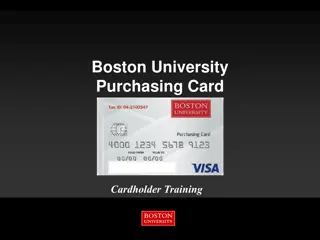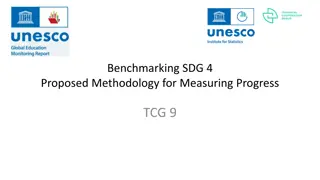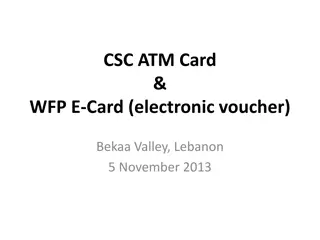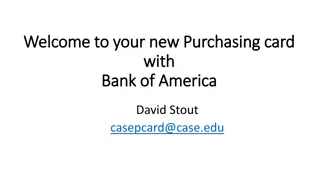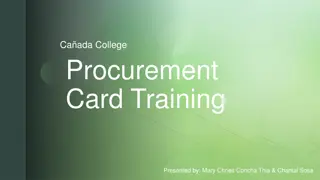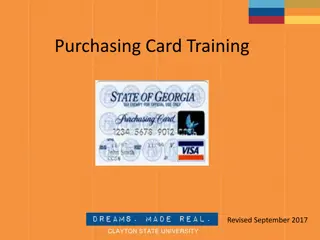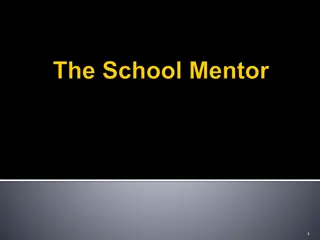Transforming Assessment System: Insights from Teachers for Holistic Progress Card
Education professionals emphasize the need for a holistic transformation in assessment practices to align with NEP 2020 objectives, focusing on developing 21st-century skills and minimizing rote learning. The shift entails realigning curriculum, pedagogy, and assessment tools, emphasizing competency-building and personalized learning adjustments. Efforts include capacity building, technological support, and creating a conducive learning environment through innovative programs like Happiness Curriculum and Deshbhakti Curriculum.
Download Presentation

Please find below an Image/Link to download the presentation.
The content on the website is provided AS IS for your information and personal use only. It may not be sold, licensed, or shared on other websites without obtaining consent from the author. Download presentation by click this link. If you encounter any issues during the download, it is possible that the publisher has removed the file from their server.
E N D
Presentation Transcript
TRANSFORMING THE SYSTEM OF ASSESSMENT:HOLISTIC PROGRESS CARD (LEARNINGS FROM TEACHERS SIDE) The Assessment Cycle Presented by: Parvinder Kumar OSD Core Academic Unit, Exam Branch/Principal GBSSS Tikri Kalan, DoE, Delhi 9
NEP Objectives Curriculum and pedagogy would be transformed by 2022 in order to minimiserotelearning and instead encourage holisticdevelopment and 21st century skills such as critical thinking, creativity, scientific temper, communication, collaboration, multilingualism, problem solving, ethics, social responsibility, and digital literacy.
TRANSFORMATION OF ASSESSMENT AND WINDS OF CHANGE IN PRESPECTIVE OF NEP 2020 Effective & Validated assessment tools at all the stages Preparatory, Lower Secondary and Secondary level). Continuous updating of Assessment tools as per students learning level and style of learning. Special emphasis competency and Capacity Building. (Developing, validation and transitions in real classroom situations) Proper technological assessment repository and Learning management system . (Foundational, on Teacher support for
Aligning of Learning Outcomes with cognitive & conative aspect of learner (Emotional, Social aspects of learner). Aligning the Pedagogy with Assessment Tools and Techniques Contextualisation of Assessment tools and techniques based on Real life situations. Assessment for Learning & Intellectual
Transformation Of The Assessment - Delhi Learning Outcomes Aligned Syllabus Learning Outcomes profile of each students. Mentors Teachers Teacher Development Coordinators National and International Capacity Building Programmes for Teachers and Principals Core Academic Unit/ Assessment Unit at the centre to align all the Academic & Assessment programmes / Innovations. Dedicated Academic Repository Mission Buniyaad to strengthen the FLN of students Dedicated Primary Branch for capacity building ,academic support and coordination with Primary Teachers. Happiness Curriculum to help the learner improve his focus & concentration abilities, Holistic joyful learning and to facilitate the teachers with new pedagogy. Deshbhakti Curriculum
Holistic Progress Report Anecdotal records Learner profile Portfolios & E- Portfolio Observation records (written/ audio or video) Meet the challenges of 21st century Reflect blended mode of assessment I.e. diagnostic, formative, summative and E-Portfolio. Parent Input to gain insight from the child s perspective. Triangulation of Data gathered by various stakeholders from time to give conclusive evidence to check stage readiness of a child. Learner Management System
Academic guidance to 4-6 mentee schools Support to TDCs ,Teachers and Principals Mentor teacher Specific focus from nursery to class 10 MTs form resource group with subject specific expertise To learn and disseminate Best pedagogies .
BASED AT SCHOOL SUPPORT TEACHERS IN ACADEMIC GROWTH Teacher ENSURE REGULAR MEETINGS Development WITH ACADEMIC RESOURCE coordinator (TDC), TEAM FOR EFFECTIVE CLASS ROOM PLANNING
LEARNER PROFILE INQUIRER KNOWLEDGEABLE THINKER COMMUNICATOR PRINCIPLED OPEN MINDED CARING RISK-TAKER BALANCED REFLECTIVE
RESPONSIBILITIES OF Core Academic Unit Development of assessment Tools and preparation of question papers Research and Analysis in the field of Education Implementation and Monitoring of Assessment Tools Alignment of Syllabus with LOs and Support Materials
CONTENT Ruhi went for an educational trip to Rajasthan . There she saw some of the plants with thick body and spines on it . She did not find any leaf on it. She thought of taking one of the plant with her to Delhi, but all her efforts went in vain , as she could not took it out of the soil.
For Pratibha group ( Science class-VI) Q1-What are the adaptations shown by the plant found in desert? Q2-Give reason, why the plants grown in desert have thick stem and spiny leaves ? Q3- Justify the statement desert plants have roots which go deep into the soil . Learning outcome: identify the characteristics of desert plants .
For Nishtha group ( Science class-VI) Given below is a plant with thick stem and spine like structure found in places where there is scarcity of water . Q1- Why do the leaves of this plant get modified into spines ? Q-2 Why this plant has thick stem ? Q-3 Is this statement True or False : This plant has roots which goes deep into the soil . Learning outcome: identify the characteristics of desert plants .
Nishtha group ( Science class-VI) Given here is a plant found in Desert . Label A ,B and C of this plant . Learning outcome: identify the characteristics of desert plants .
Checking the understanding: a new approach NOW Earlier: What do you understand by unemployment? Read the following situations carefully and state whether the concerned persons are employed or unemployed. Justify your answer. (i) Dinesh works as a daily wage labourer in Delhi. He earns Rs. 150 per day whereas the going wages are more than his daily earnings. (ii) Ramesh is a 25 year old man living in Delhi. His father is a trader, but Ramesh is not interested in working.
SOCIAL SCINECE CLASS VI (PRATIBHA) EARLIER Write the works of Municipal Corporation of Delhi. NOW In your area, the heap of garbage are lying here and there. Which civic agency will clean it and what other works this agency do?
PUZZLE BASED QUESTION Earlier: Write four Human made resources. NOW: Read the puzzle and find out four human made resources. P B U S P G B E A P H O N E N T C B O O K T T A B L E E B R I D G E N S C H O O L S R A M C A R T
What kind of Assessment system we want? Same for all Targeting to extract the best of Individual Task 1- Complete the 100 meter race Task- Complete the 100 Sprint race Participants- Task 2- Complete the 100 meter Swimming race Participants- Vs Task 3- Complete the Tree Climbing race Participants- Task 4- Weight Lifting Competition Participants-




![Guardians of Collection Enhancing Your Trading Card Experience with the Explorer Sleeve Bundle [4-pack]](/thumb/3698/guardians-of-collection-enhancing-your-trading-card-experience-with-the-explorer-sleeve-bundle-4-pack.jpg)
